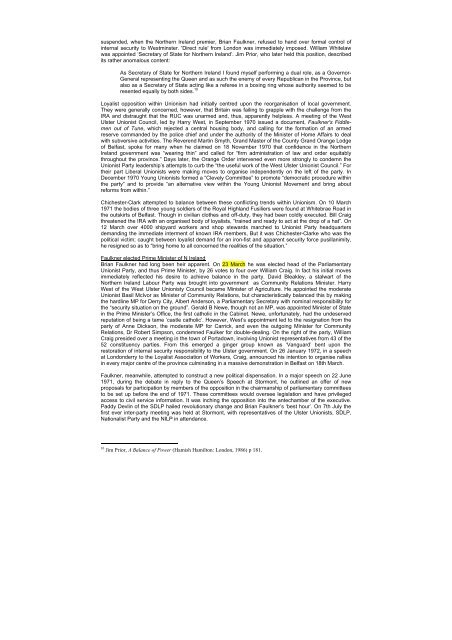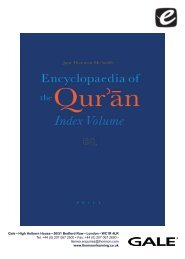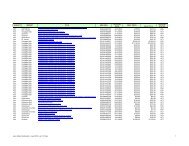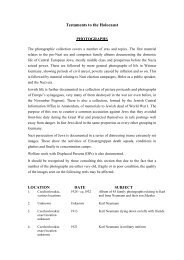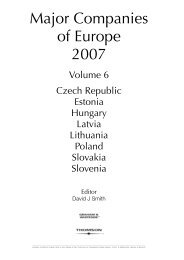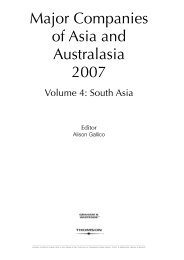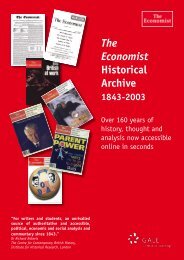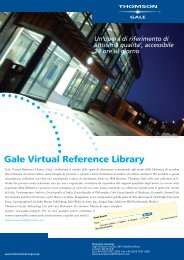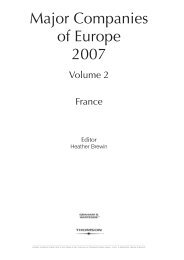The End of Stormont and imposition of direct rule in 1972
The End of Stormont and imposition of direct rule in 1972
The End of Stormont and imposition of direct rule in 1972
You also want an ePaper? Increase the reach of your titles
YUMPU automatically turns print PDFs into web optimized ePapers that Google loves.
suspended, when the Northern Irel<strong>and</strong> premier, Brian Faulkner, refused to h<strong>and</strong> over formal control <strong>of</strong><br />
<strong>in</strong>ternal security to Westm<strong>in</strong>ster. 'Direct <strong>rule</strong>' from London was immediately imposed. William Whitelaw<br />
was appo<strong>in</strong>ted ‘Secretary <strong>of</strong> State for Northern Irel<strong>and</strong>’. Jim Prior, who later held this position, described<br />
its rather anomalous content:<br />
As Secretary <strong>of</strong> State for Northern Irel<strong>and</strong> I found myself perform<strong>in</strong>g a dual role, as a Governor-<br />
General represent<strong>in</strong>g the Queen <strong>and</strong> as such the enemy <strong>of</strong> every Republican <strong>in</strong> the Prov<strong>in</strong>ce, but<br />
also as a Secretary <strong>of</strong> State act<strong>in</strong>g like a referee <strong>in</strong> a box<strong>in</strong>g r<strong>in</strong>g whose authority seemed to be<br />
resented equally by both sides. 10<br />
Loyalist opposition with<strong>in</strong> Unionism had <strong>in</strong>itially centred upon the reorganisation <strong>of</strong> local government.<br />
<strong>The</strong>y were generally concerned, however, that Brita<strong>in</strong> was fail<strong>in</strong>g to grapple with the challenge from the<br />
IRA <strong>and</strong> distraught that the RUC was unarmed <strong>and</strong>, thus, apparently helpless. A meet<strong>in</strong>g <strong>of</strong> the West<br />
Ulster Unionist Council, led by Harry West, <strong>in</strong> September 1970 issued a document, Faulkner's Fiddlemen<br />
out <strong>of</strong> Tune, which rejected a central hous<strong>in</strong>g body, <strong>and</strong> call<strong>in</strong>g for the formation <strong>of</strong> an armed<br />
reserve comm<strong>and</strong>ed by the police chief <strong>and</strong> under the authority <strong>of</strong> the M<strong>in</strong>ister <strong>of</strong> Home Affairs to deal<br />
with subversive activities. <strong>The</strong> Reverend Mart<strong>in</strong> Smyth, Gr<strong>and</strong> Master <strong>of</strong> the County Gr<strong>and</strong> Orange Lodge<br />
<strong>of</strong> Belfast, spoke for many when he claimed on 18 November 1970 that confidence <strong>in</strong> the Northern<br />
Irel<strong>and</strong> government was “wear<strong>in</strong>g th<strong>in</strong>” <strong>and</strong> called for “firm adm<strong>in</strong>istration <strong>of</strong> law <strong>and</strong> order equitably<br />
throughout the prov<strong>in</strong>ce.” Days later, the Orange Order <strong>in</strong>tervened even more strongly to condemn the<br />
Unionist Party leadership’s attempts to curb the “the useful work <strong>of</strong> the West Ulster Unionist Council.” For<br />
their part Liberal Unionists were mak<strong>in</strong>g moves to organise <strong>in</strong>dependently on the left <strong>of</strong> the party. In<br />
December 1970 Young Unionists formed a “Clevely Committee” to promote “democratic procedure with<strong>in</strong><br />
the party” <strong>and</strong> to provide “an alternative view with<strong>in</strong> the Young Unionist Movement <strong>and</strong> br<strong>in</strong>g about<br />
reforms from with<strong>in</strong>.”<br />
Chichester-Clark attempted to balance between these conflict<strong>in</strong>g trends with<strong>in</strong> Unionism. On 10 March<br />
1971 the bodies <strong>of</strong> three young soldiers <strong>of</strong> the Royal Highl<strong>and</strong> Fusiliers were found at Whitebrae Road <strong>in</strong><br />
the outskirts <strong>of</strong> Belfast. Though <strong>in</strong> civilian clothes <strong>and</strong> <strong>of</strong>f-duty, they had been coldly executed. Bill Craig<br />
threatened the IRA with an organised body <strong>of</strong> loyalists, “tra<strong>in</strong>ed <strong>and</strong> ready to act at the drop <strong>of</strong> a hat”. On<br />
12 March over 4000 shipyard workers <strong>and</strong> shop stewards marched to Unionist Party headquarters<br />
dem<strong>and</strong><strong>in</strong>g the immediate <strong>in</strong>terment <strong>of</strong> known IRA members, But it was Chichester-Clarke who was the<br />
political victim; caught between loyalist dem<strong>and</strong> for an iron-fist <strong>and</strong> apparent security force pusillanimity,<br />
he resigned so as to “br<strong>in</strong>g home to all concerned the realities <strong>of</strong> the situation.”<br />
Faulkner elected Prime M<strong>in</strong>ister <strong>of</strong> N Irel<strong>and</strong><br />
Brian Faulkner had long been heir apparent. On 23 March he was elected head <strong>of</strong> the Parliamentary<br />
Unionist Party, <strong>and</strong> thus Prime M<strong>in</strong>ister, by 26 votes to four over William Craig. In fact his <strong>in</strong>itial moves<br />
immediately reflected his desire to achieve balance <strong>in</strong> the party. David Bleakley, a stalwart <strong>of</strong> the<br />
Northern Irel<strong>and</strong> Labour Party was brought <strong>in</strong>to government as Community Relations M<strong>in</strong>ister. Harry<br />
West <strong>of</strong> the West Ulster Unionisty Council became M<strong>in</strong>ister <strong>of</strong> Agriculture. He appo<strong>in</strong>ted the moderate<br />
Unionist Basil McIvor as M<strong>in</strong>ister <strong>of</strong> Community Relations, but characteristically balanced this by mak<strong>in</strong>g<br />
the hardl<strong>in</strong>e MP for Derry City, Albert Anderson, a Parliamentary Secretary with nom<strong>in</strong>al responsibility for<br />
the “security situation on the ground”. Gerald B Newe, though not an MP, was appo<strong>in</strong>ted M<strong>in</strong>ister <strong>of</strong> State<br />
<strong>in</strong> the Prime M<strong>in</strong>ister’s Office, the first catholic <strong>in</strong> the Cab<strong>in</strong>et. Newe, unfortunately, had the undeserved<br />
reputation <strong>of</strong> be<strong>in</strong>g a tame ‘castle catholic’. However, West’s appo<strong>in</strong>tment led to the resignation from the<br />
party <strong>of</strong> Anne Dickson, the moderate MP for Carrick, <strong>and</strong> even the outgo<strong>in</strong>g M<strong>in</strong>ister for Community<br />
Relations, Dr Robert Simpson, condemned Faulker for double-deal<strong>in</strong>g. On the right <strong>of</strong> the party, William<br />
Craig presided over a meet<strong>in</strong>g <strong>in</strong> the town <strong>of</strong> Portadown, <strong>in</strong>volv<strong>in</strong>g Unionist representatives from 43 <strong>of</strong> the<br />
52 constituency parties. From this emerged a g<strong>in</strong>ger group known as ‘Vanguard’ bent upon the<br />
restoration <strong>of</strong> <strong>in</strong>ternal security responsibility to the Ulster government. On 26 January <strong>1972</strong>, <strong>in</strong> a speech<br />
at Londonderry to the Loyalist Association <strong>of</strong> Workers, Craig, announced his <strong>in</strong>tention to organise rallies<br />
<strong>in</strong> every major centre <strong>of</strong> the prov<strong>in</strong>ce culm<strong>in</strong>at<strong>in</strong>g <strong>in</strong> a massive demonstration <strong>in</strong> Belfast on 18th March.<br />
Faulkner, meanwhile, attempted to construct a new political dispensation. In a major speech on 22 June<br />
1971, dur<strong>in</strong>g the debate <strong>in</strong> reply to the Queen’s Speech at <strong>Stormont</strong>, he outl<strong>in</strong>ed an <strong>of</strong>fer <strong>of</strong> new<br />
proposals for participation by members <strong>of</strong> the opposition <strong>in</strong> the chairmanship <strong>of</strong> parliamentary committees<br />
to be set up before the end <strong>of</strong> 1971. <strong>The</strong>se committees would oversee legislation <strong>and</strong> have privileged<br />
access to civil service <strong>in</strong>formation. It was <strong>in</strong>ch<strong>in</strong>g the opposition <strong>in</strong>to the antechamber <strong>of</strong> the executive.<br />
Paddy Devl<strong>in</strong> <strong>of</strong> the SDLP hailed revolutionary change <strong>and</strong> Brian Faulkner’s ‘best hour’. On 7th July the<br />
first ever <strong>in</strong>ter-party meet<strong>in</strong>g was held at <strong>Stormont</strong>, with representatives <strong>of</strong> the Ulster Unionists, SDLP,<br />
Nationalist Party <strong>and</strong> the NILP <strong>in</strong> attendance.<br />
10 Jim Prior, A Balance <strong>of</strong> Power (Hamish Hamilton: London, 1986) p 181.


